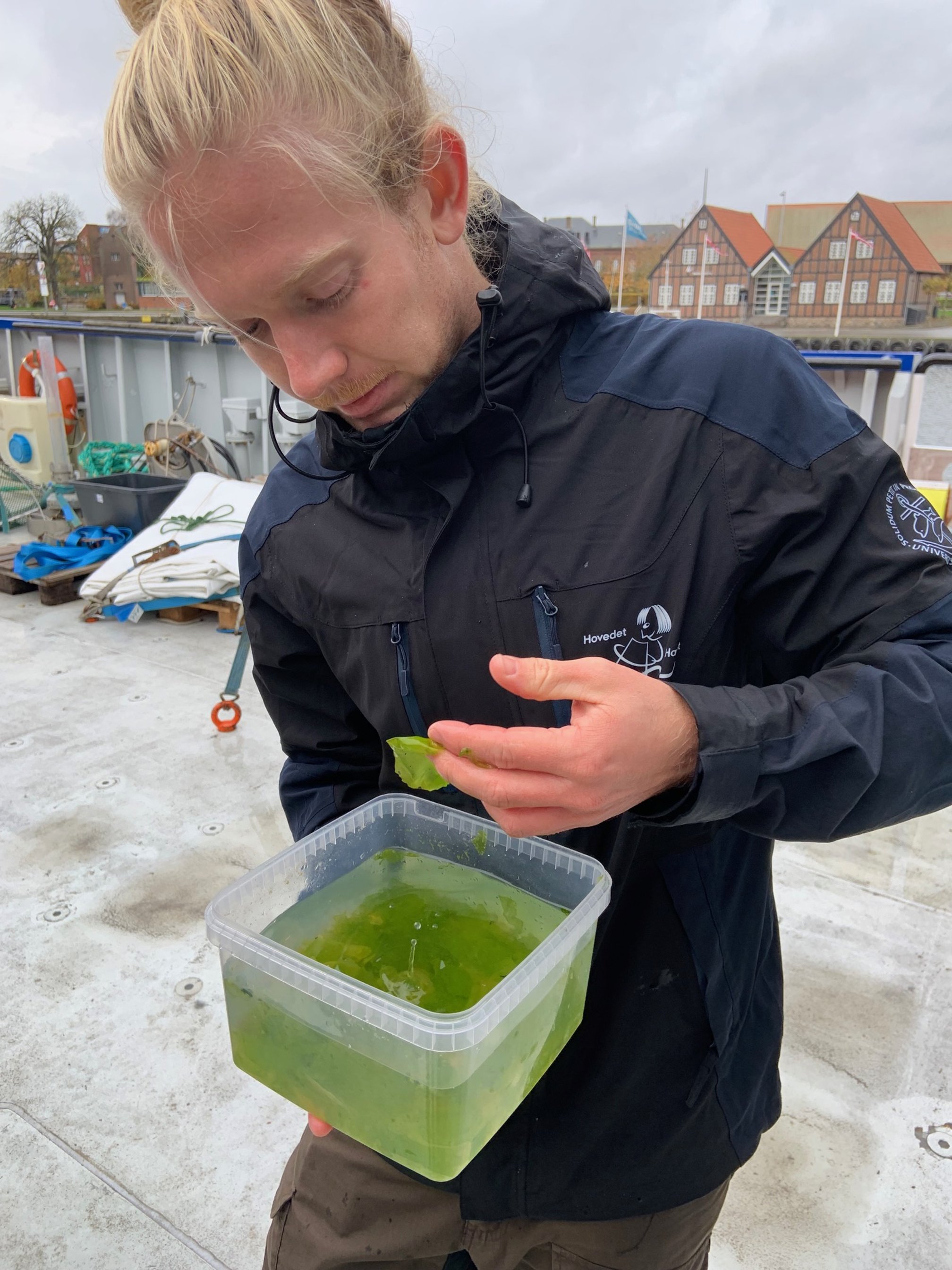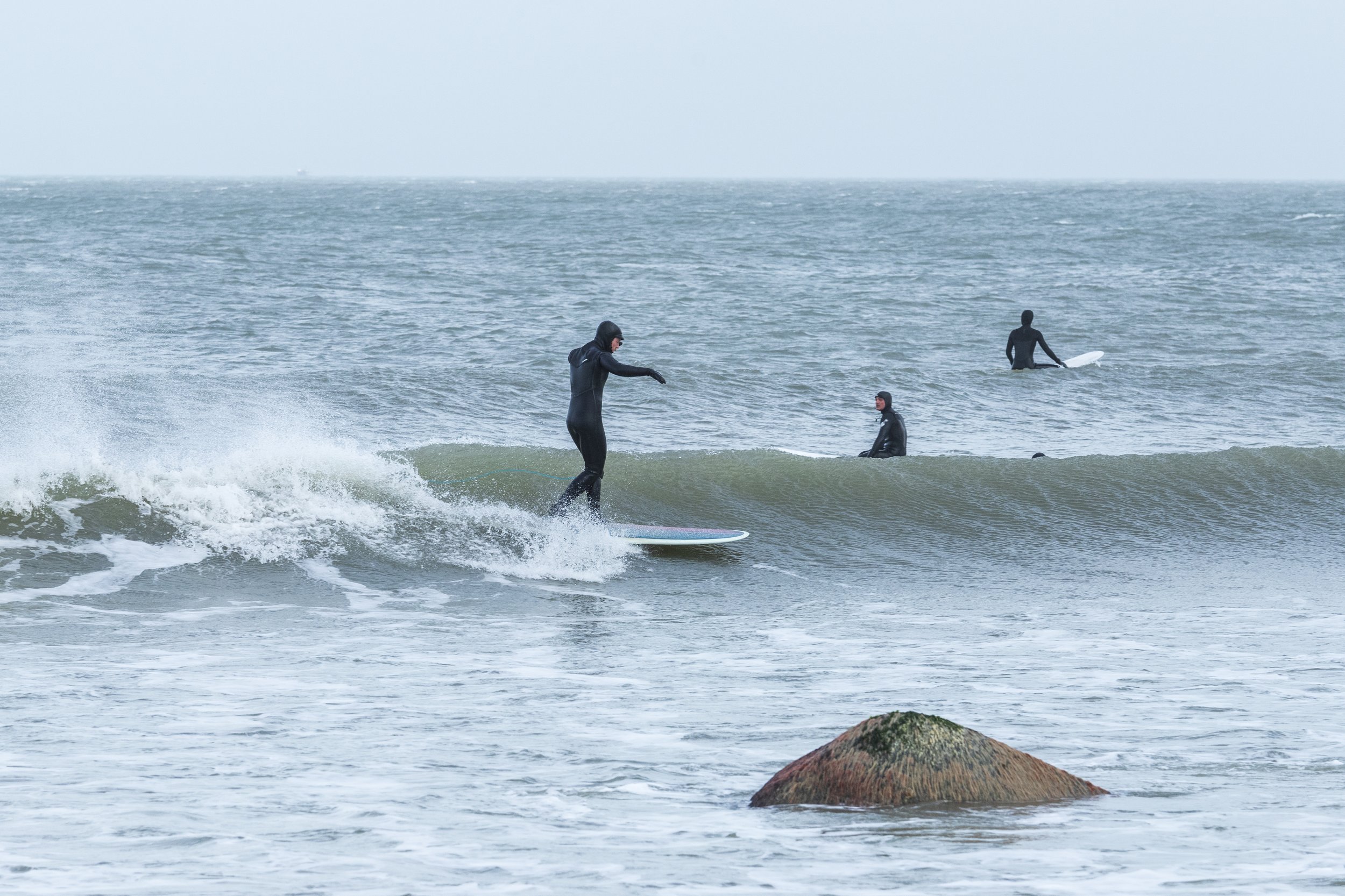KRISTOFFER
Kristoffer Larsen-Ledet, a surfer and Biology student at Aarhus University, tells us that there’s about a million ways to learn about and protect our oceans and marine biodiversity!
Kristoffer is raised in the North West coast of Jutland, and his fascination by animals and nature and long hours spent wandering around the local fields and woods as a child naturally led to a huge interest in the ocean, marine biology, and water sports.
A MISSION TO UNDERSTAND & EDUCATE
As a Biology student, Kristoffer’s latest interest and project has to do with how we can grow seaweed to absorb nutrient pollutants from the water and how this seaweed may be used for human consumption or agricultural purposes. One of the most noteworthy things, beyond volunteering at different environmental clubs and events organising beach cleanups in his hometown Løkken, Kristoffer engages in is his work for the “Hovedet i Havet” project at Aarhus University.
"We teach students in Denmark about the ocean, and we cover subjects such as marine biotopes, food webs and eutrophication. The importance of marine sustainability has mostly been clear to me during my biology studies. Hearing about how humans have used and extorted the marine resources for centuries made me passionate about bringing these problems into the mind of everyday people, and to address them more widely.”
Kristoffer tells us that “the oceans are vast, and the problems are many”. As he explains, in Denmark one of the issues is nutrient pollution (also known as eutrophication). Nutrient pollution is the product of the chemicals nitrate and phosphorus leaking into streams and lakes from land sources. These nutrients follow the water stream until it reaches the fjords and coastal waters. The extra nutrients cause microalgae and seaweed to grow more than normal. When the algae die, they drop to the bottom where bacteria eat them. All this is perfectly natural but since the industrial evolution, humans have added extra nutrients to the process. It has come to a point where every year the bacteria munching away on the sea bottom use up all the oxygen in the water for long periods of time, causing fish and other animals to flee or die. These dead zones are getting more serious every year and they disturb the local ecosystems for several years after an event. That is why Kristoffer believes it is crucial that we reduce nutrient pollution to allow the Danish coastal ecosystems more stability.







A HUGE FAN OF THE OCEAN WITH AN EYE ON SUSTAINABILITY
When Kristoffer is not in Aarhus studying or working on projects, he finds some time for surfing. He sees surfing as a great activity, one where the mind can relax and focus on one thing at a time. Kristoffer has been interested in the ocean for most of his life, but particularly after the first time he tried snorkelling. The ocean is where he finds peace. It is a place to relax and contemplate, and where he expresses himself and releases frustration.
"The feeling of observing the strange, underwater world opened my eyes and ever since I have wanted to spend time in the water and help these magnificent ecosystems...I enjoy the many faces of the ocean; one day calm the next day vicious."
Kristoffer is interested in sustainability and the problems that marine ecosystems are facing, like the loss of marine habitats as well as nutrient- and plastic pollution. His hope is that, through his education and passion about these topics, he can help and inspire others to improve the state of our oceans. He does his best to cut down on consumerism and votes for politicians who support green ideals. He refrains from buying food he will not use, and keeps clothes shopping at a minimum and as sustainable as possible (so not at all).
"I am no saint. I still eat meat and use plastic bags, but I try to be aware of how my consumption is affecting the climate, the biodiversity, and the oceans."
A CURIOUS MIND
Our Ocean Hero’s happiest moments from the ocean are as a child going snorkelling. As he describes it, it didn’t matter if it was at coral reefs or ordinary sand bottom places - he loved looking for animals and other interesting underwater organisms.
“This introduced me to many different marine habitats and instilled a curiosity to learn more… and annoy my parents with heaps of geeky questions.!”
Kristoffer is greatly inspired by all his fellow students at Aarhus University, it gives him energy and motivation to hear people talking about what they are interested in, and how they would like to contribute to the world and dedicate their time and life into sustainability and educating others about it. Our Ocean Hero thinks that we depend on and owe a lot to our oceans - a place of life and diversity we need to protect and preserve to secure our own survival.
#TAVAHA
For me personally the greatest thing people can do is to recognise that everything we do have an environmental impact. This impact can be positive or negative and it is impossible to be only good or only bad. But the knowledge of how decisions affect the environment, and the ocean can break habits and norms which you do not need or do not deem necessary anymore. So, in short - TAHAVA means the urge to learn new things and reflect on your way of life all the time.
Kristoffer’s three tips are simple:
Think about how your everyday greens and meat are being produced and what carbon and nitrogen footprint it might have.
Small acts of environmentalism are better than nothing - collecting a few pieces of waste is better than none and only purchasing one steak is better than getting two.
BE INSPIRED! Go out and try to learn something new about your local beach or fjord occasionally, whether it is the local history, or the name of a new animal. Learning new things will help you stay motivated to take care of the ocean!
You can follow more of Kristoffer’s work on his Instagram profile @kristofferlarsenledet

